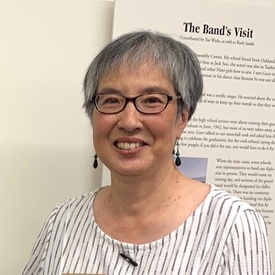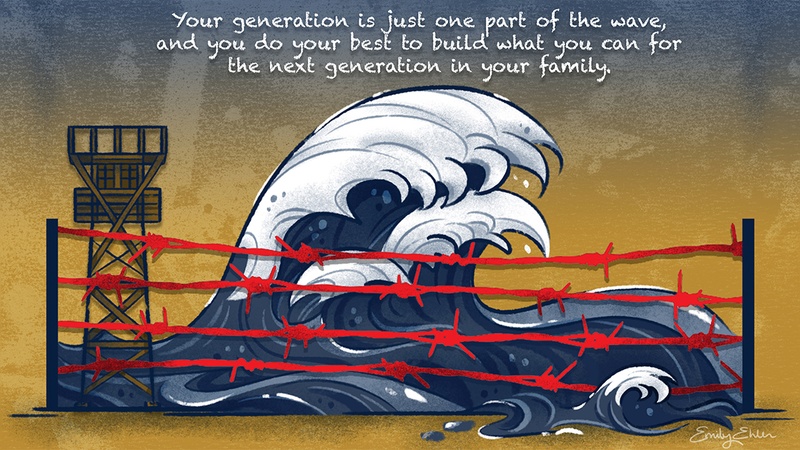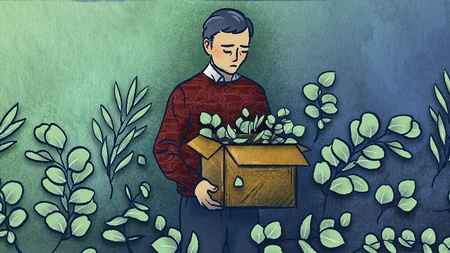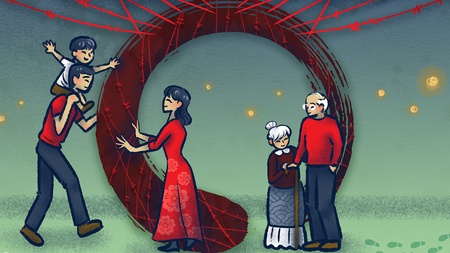When oral historian Shanna Farrell began interviewing descendants of Japanese Americans incarcerated by the U.S. during World War II, she didn’t make any assumptions.
“They are not monoliths,” said Farrell, who has been on staff at the Bancroft Library’s Oral History Center since 2013. “Each person has experienced their ancestors’ incarceration differently — some are deeply affected and have spent their lives processing and expressing the trauma, and for some, they aren’t affected as deeply.”
The project, called Japanese American Intergenerational Narratives, explores the ways that intergenerational trauma and healing happened after incarceration. Farrell, along with the Oral History Center’s Amanda Tewes and Roger Eardley-Pryor, interviewed 23 descendants whose ancestors were incarcerated in two prison camps — Manzanar in California and Topaz in Utah. The interviews explore identity, community, creative expression and the stories families pass down.
“There has been a ton of work done on survivors of the WWII incarceration camps,” said Farrell. “We were really focused on how stories get passed down. We approached the project wondering: Does that trauma get passed down intergenerationally? And if it does, is healing possible?”
From more than 100 hours of interviews, Farrell and her team produced the series, “From Generation to Generation: The Legacy of Japanese American Incarceration.” It's the eighth season of the Oral History Center's podcast, the Berkeley Remix.
Berkeley News talked with Farrell about the project and the new podcast season.
* * * * *
Can you tell me about the Japanese American Intergenerational Narratives Project? How did it begin, and who did you interview?
The project started in April 2020 during the coronavirus pandemic lockdown. It was funded by the National Park Service through the Japanese American Confinement Sites Program Grant. We wanted to focus on trauma and healing in the generations that came after the survivors of the Japanese Americans incarcerated during WWII, and we used healing as a throughline on which to center the project and interviews.
We talked with 23 descendants of survivors over Zoom for about four hours each — two sessions of two hours — and collected over 100 hours of interviews. People either nominated themselves or someone they knew, so it was more of an opt-in project rather than trying to find people to participate. The people we interviewed, whom we call narrators, ranged in age from people in their 30s to people in their 80s, so we interviewed several generations.
Why did you choose to focus on descendants’ experiences?
There has been a lot of work done about the survivors of the Japanese American prison camps and much less about the legacy of their incarceration — how it impacted generations after them. I think it’s important to move past the dominant narrative that survivors’ experiences are the only ones that matter and to examine the legacy of trauma and how people have found their way through it.
The reality is that 120,000 people were forcibly removed from their homes and put into prison camps for no other reason than their race and heritage. Then, when the camps closed, many had to start over. So many people lost everything and were basically given a pittance and a bus ticket. It uprooted and devastated a lot of different communities, and that legacy continues today. And I think if we ignore the experiences of descendants, we’re actually ignoring history, because it does continue; it’s not a static thing. And it’s important to think about the ripples of this today, so we don’t repeat them in the future.
For the podcast series, what themes did you explore?
We decided to focus on four major themes that emerged from our interviews. In the first episode, we started in the present with activism and how survivors and descendants built diverse coalitions and became involved in social justice issues, from the anti-Vietnam War movement to family separation at the U.S.-Mexico border.

In the second episode, we took a step back and talked about the history, legacy and contested memory of the incarceration. Contested memory is a big theme because descendants grew up hearing different stories from their families or in their research; it wasn’t firsthand for them. So we examine the idea of who gets to tell a story or who a story belongs to.
Next, we explored identity and belonging in the Japanese American community — about what it feels like to be between two worlds. A majority of narrators talked about travel to Japan and how significant that was. We [the interviewers] were not expecting that at all. But it was complicated for them. In that episode, we included someone saying, “I’ve never felt more Japanese than when I’m in America, and I’ve never felt more American than when I’m in Japan.”
That goes back to when you were talking about how descendants aren’t monoliths — that they have multiple identities and complex feelings that interconnect and diverge from one another’s.
Yeah, and one way these different identities often came through was in the food they ate. We talked with them a lot about food and what they ate during the holidays. One person who was Korean American and Japanese American grew up eating Korean food as her comfort food. Another person usually ate American food, like chicken nuggets. Someone else was a descendant of a Holocaust survivor, and their holiday meals were European and Japanese and even Italian, because they had a housekeeper who was Italian.
And in the last episode, you explore the ways that descendants process the history and intergenerational trauma through creative expression and memorialization. Can you tell me about that?
Yeah, a lot of people talked about the importance of art in their lives and expressing themselves through art. Some descendants embraced art and public memorialization about incarceration history to honor the experiences of their ancestors and as ways to work through the intergenerational impact of this incarceration. Others seek healing by going on pilgrimages to the actual sites of incarceration, where they reclaim the narratives of these places.
How did you prepare for and approach these interviews, given the sensitive and potentially traumatic nature of the subject matter?
There’s a subgenre of oral history called trauma-informed interviewing. I got my master’s degree at Columbia University in their oral history master’s program, where there was a heavy focus on trauma-informed interviews. And for this project, we did a lot of reading of new literature about how to approach these interviews. At the end of the day, trauma comes up in places where you least expect it.
We thought about this a lot, in terms of project design. We asked ourselves, “How do we talk about traumatic events in a way that doesn’t feel too risky or too much for the narrators?” And much of that is baked into the oral history process.
First, we have a pre-interview with the narrator, where we go over what we’re going to be talking about and how, so that they’re prepared mentally, emotionally and intellectually before the actual interview. We let them know that they can stop or withdraw from the process anytime. Then, during the interview, we ask permission to talk about specific topics and pick up on cues if they don’t want to discuss something.
And finally, we have the interviews transcribed and ask the narrators to review and edit them, although we like to keep transcripts as close to the actual audio as possible. We have had people request to seal the interviews, and we don’t make them public unless narrators give their permission. We give narrators a lot of control over what happens.
How were you able to support the narrators after they did these interviews?
One of our project advisers, Lisa Nakamura, is a psychotherapist, and she is a descendant herself, and she specializes in intergenerational trauma. She does something called healing circles, which is basically group therapy. In this case, she led healing circles to help narrators process their interview experience. And we offered that to narrators as a resource, along with a list of other resources. None of us were there or knew who went or anything. It was purely for them to process their experience and the feelings that came up, if they wanted to.
What do you hope people take away from this podcast and larger project?
I hope that people, if they don’t know about this history, now they do. Not everybody knows this history. I’m from the East Coast, and I didn't know about it until I moved to California and did one of my first oral history interviews with a woman whose ex-husband’s family had been incarcerated and then experienced housing discrimination in Berkeley. And that feels terrible, that many of us in the U.S. aren’t educated about this history.
I also hope it helps show that things like incarceration have a long legacy that continue today. And that it helps us all understand that this traumatic event is maybe a part of who a person is, but it doesn’t define them if they don’t want it to. And there are a lot of positive things that can grow from it, like artwork and music. And I’m always happy when people listen.
* * * * *
Listen to the new season of the Berkeley Remix: “From Generation to Generation.”
Learn more about the Japanese American Intergenerational Narratives project.
Season eight of the Oral History Center's Berkeley Remix podcast was created from 100 hours of interviews with 23 descendants of Japanese Americans incarcerated during World War II.
*This article was originally published in Berkeley News on December 14, 2023.
© 2023 Anne Brice






